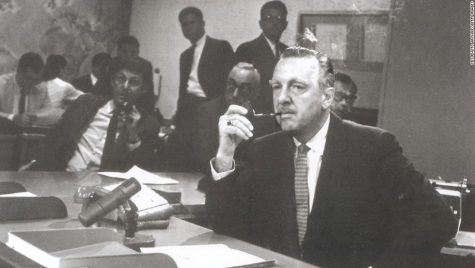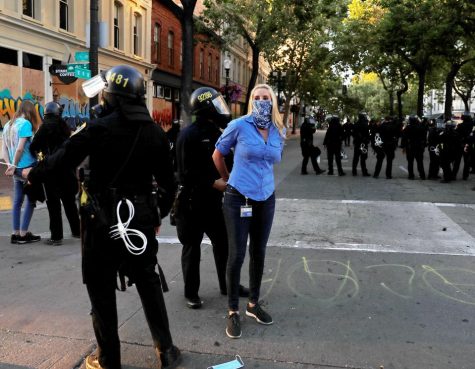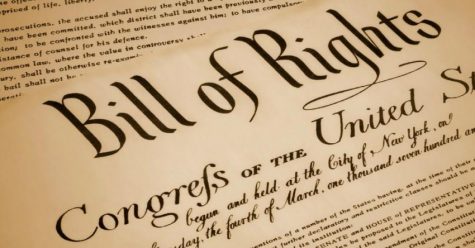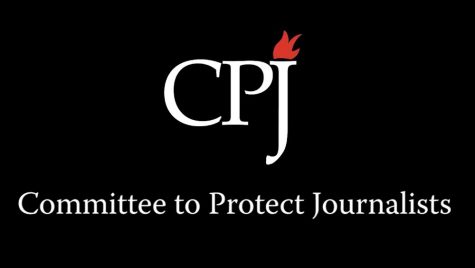Freeing the Freelancer
“The Current Crisis Surrounding Our Country’s First Amendment / The Wretched Pangs of Dread Suffered by The Modern Journalist.”
The United States Bill of Rights, which comprises the first ten amendments to the U.S. Constitution was ratified the 15th of December, 1791. Out of all ten, it’s usually the first addition that’s not only the most referenced but also the most actively discussed.
Our First Amendment Rights are guaranteed as such:
“Congress shall make no law respecting an establishment of religion, or prohibiting the free exercise thereof; or abridging the freedom of speech, or of the press; or the right of the people peaceably to assemble, and to petition the Government for a redress of grievances.”
In the 244 years the United States has been a country, including the time prior to, and post the adoption of the Constitution, the U.S. populace has struggled to formulate a unified perspective regarding the ideas presented by the amendment.
Reactionists clash with those inclined in a progressing with the current political status quo; as per what’s referenced in the amendment, with every occurrence of a new social reform, or civil rights movement there’s bound to be a strong amount of precedence placed on the first amendment, as opposed to the other Constitutional amendments in the Bill of Rights, as well as in comparison to most other founding/national documents.
This is justifiably predictable when considering how much of what we consider to be a part of the core makeup of the country is outlined in a mere sentence.
Our Congressional electees can’t prevent the freedom to hold one’s religious values. They can’t stop you (within reason) from saying whatever you please; anyone is legally able to assemble in a peaceful manner and everyone is able to petition the actions of the Government for a ‘redress of grievances’ and or everything that could possibly translate to.
Of course, I’m going to focus on journaling the aspect I left out, that being the freedom of the press which mostly deals with investigative journalism and active on-the-spot reporting. Though, all of these values, as noted, are crucial to the development of our country as well as both the happiness and security of our communities. Going back in time for a second or two, context is pretty important in history, especially for a middle-aged, colourful country like the United States.
The freedom of speech, and of the press are some of the most deeply ingrained values of all; the first attempt at a newspaper or press release in the country came prior to the Declaration of Independence, as a single issue of Publick Occurrences Both Forreign and Domestick issued the 25th of September in what’s now Boston all the way back in 1690 during the colonial era of the country when it was under strict British rule and regulation.
These strictly enforced rules and regulations led to the paper being shut down immediately after the first issue was published. All this immediate act of suppression did was spark a fire that continues to burn in the hearts of Americans today as much as it did then; the want and or need to maintain a free press is a value mostly shared among each era’s equivalent of the average, every day American. Soon enough after, in 1704 The Boston News-Letter was published and it became the first recurring newspaper in the colonies.
The Post-Declaration of Independence United States, as we all know, would go on to spawn its share of iconic newspapers and news reporters/broadcasters (e.g. Walter Cronkite).

Without going into the extensive history of journalism and newspapers in the United States, I’d like to focus on a global issue, one that affects the freedom of the press in the many nations of the world, including both those that maintain a national equivalent to the U.S.’s first amendment and those that don’t.
Violence against journalists, and the suppression of such individuals, thus including the suppression of the press as a whole, has been a recurring issue in the United States. In particular, however, it’s an incredibly timely issue now when considering the contemporary state of the country and the numerous societal disorders impacting all of our lives.
Journalists (specifically of the investigative breed) are targeted for a variety of reasons; whether it be due to their nosiness or unrelenting nature to get to the bottom of a story, or both, journalists are targeted and often straight up killed all over the world. Terrorist groups, iron-fisted dictatorships (or, in regards to the past few months in the U.S., some members of local law enforcement,) and the like are all responsible for the assaults, violence against and suppression of both independent and non-independent journalists.
Avenues developed specifically in order to protect against all manner of journalists have popped up here and there over the decades in order to protect the group especially in other countries where there’s no intended legal protection of speech.
The Committee to Protect Journalists was formed back in 1981 and it’s one of the many recognized non-profits that help support the protection of journalists; the Freedom of the Press Foundation was only formed back in 2012, yet it’s still fairly active and has its own presence.
The Freedom of the Press Foundation’s mission statement is that it’s a “501(c)3 non-profit organization that protects, defends, and empowers public-interest journalism in the 21st century,” with the organization also working “to preserve and strengthen First and Fourth Amendment rights guaranteed to the press through a variety of avenues, including the development of encryption tools, documentation of attacks on the press, training newsrooms on digital security practices, and advocating for the public’s right to know”.
These organizations take preventative measures like the ones mentioned, as well as general measures to promote the safety of journalists in a risky modern environment, however even with this being the case there are usually hundreds of casualties, fatal or otherwise, in the journalistic field. No matter the nature of the tragedies, however, journalists usually retain their pestering tenacity against suppression.
A recent New York Times article referenced how journaling cartoonists in France recently republished a set of editorial cartoons that depict the Islamic prophet Muhammed, said cartoons having prompted a terrorist attack that killed 12 members of the paper way back in 2015.
On a similar note within a foreign country, also being a recent event reported by The New York Times, Algerian journalist Khaled Drareni had been imprisoned since March of this year due to his investigative reporting on the Hirak protests which had been occurring in the country. Such imprisonments (as indicated) aren’t uncommon in both developed and undeveloped countries; Drareni’s imprisonment is just one in many, although no matter the individual such repression of journalists warrants public backlash and political movement.
Shifting back to the current state of the United States in particular, our First and Fourth Amendment rights have been in a lot of controversial questioning recently; with the George Floyd protests and riots, a lot has been uncertain between both protesters and journalists, with a lot of journalists being targeted in the chaotic hot-zones dotting the streets.
According to a Forbes article that uses information collected by both the Committee to Protect Journalists and the Freedom of the Press Foundation, about 328 ‘press freedom violations’ have occurred between the 26th of May and the 6th of June; these violations are generally spawned from the direct targeting of journalists when they’re reporting on protests (that include police involvement) and or rioting. The myriad of articles that document such cases are proof enough of the issue’s relevance on a contemporary basis, let alone historically.
Assaults are always a large issue, but unlawful, targeted arrests at the scene of protests is one of the major talking points among critics.

Journalists are often held and searched in an unwarranted nature, with the Writ of Habeas Corpus being one of the few sources journalists can use to help remedy their situation when unlawfully incarcerated (if only momentarily). Such awful conditions for journalists, especially during such a politically active age, brings a lot of pain to the minds of modern reporters and generally creates an unhealthy environment where the freedom of journalists feels like an afterthought.
Unwarranted arrests are definitely a sour set of marks that plague journalists, yet any form of suppression is incredibly damaging and directly contradicts the intentions and efforts expressed by the founding fathers centuries prior. Without even the most rudimentary forms of the press, there was never a guarantee in the Revolutionary period that the colonists would be knowledgeable as to decide on whether or not they were willing to separate from Great Britain; journalism in the periods surrounding the Spanish-American, both World Wars and Vietnam in particular, alongside civil rights movements from the original abolitionist movements in the 1700’s to those of the 1960’s Civil Rights protests, all play into the importance of journalism within the United States (and, when adjusted, the world as a whole).
Right now the need for proactive journalists is at an all time high. TED writer Patrick D’Arcy claimed in a 2017 article, that of which used examples of attacks on journalists and whistleblowers within both the Obama administration and early Trump administration, that “the US owes its existence in part to a free press,” referring to its immense influence over the country and again harkening back to the democratic beliefs of the founding fathers during the Revolutionary era.
It’s for this reason that journalism and it’s dedicated journalists need to be protected; there are a few ways we can go about this.
Mirroring the efforts of journalists is one of the best possible opportunities to get some noise to follow the suppression of journalism in the country; considering how powerful social media has become in the past decade or two, turning everyone into an ‘amateur journalist’ of their own, it’s indeed a potent tool for getting the voice of the many out in order to back struggling journalists and criticize civil rights violations.
Reaching out to officials and the local police departments in cities that are (as of this article’s relevance) housing protests and rioting for their opinion and words on the matter is also a viable choice.
A simple, yet effective measure, would be to donate to papers/firms individually, as well as non-profit organizations like the Freedom of the Press Foundation and the Committee to Protect Journalists in order to help further prevent the targeting of journalists and make sure that when journalists face violence it doesn’t go unnoticed. On the most local level, bringing the matter up to those involved with protests can help prevent future casualties; supporting a journalist you know (like me) can prevent direct targeting as journalists that are pretty hot in the public spotlight are often left alone (in this country at least).
No matter how the masses decide, if they choose to do so, to aid in the prevention of violence against journalists in the 21st century, doing so would be not much more than history repeating itself. The protection of the press and our individual freedoms as a whole has been a priority of Americans for years.
To those that would proclaim, to any extent, that the suppression of ‘nosy’ journalists is in any way a positive measure for the protection of anything at all, I say bunk. By suppressing the civil rights of others, you’re not only warranting the destruction of all this country has developed to become, but also the destruction of your own rights as they’d be fairly stripped away themselves. Supporting the freedom of the press is more than supporting ‘nosy’, unwanted journalists, and it always will be.
It seems as though the freedom of the press can only die with Democracy itself, and so we’ll surely know that the country has fallen once there’s not a barrage of microphones in the faces of aging politicians and celebrities.
Let’s protect journalists then, as in doing so you’re protecting your country and to a further extent democracy yourself; we ought to do our part by fighting the good fight that’s been raging for at least 244 years, but likely much, much more.
“jour·nal·ist”
/ˈjərn(ə)ləst/
noun
- ‘A person who writes for newspapers, magazines, or news websites or prepares news to be broadcast.’
Schulze-Miller

Aden Schulze-Miller is a senior and it's his third year working for The Ridge Review; he's our Editor in Chief. He enjoys watching movies, writing short stories, and is ready to help foster a...





